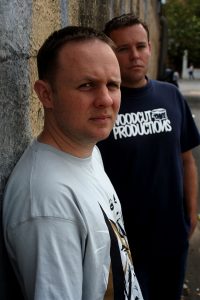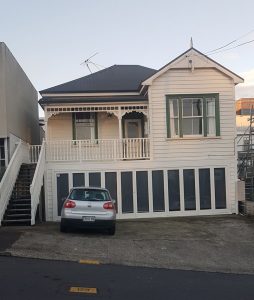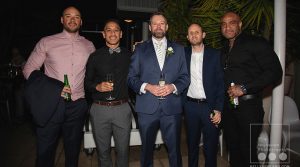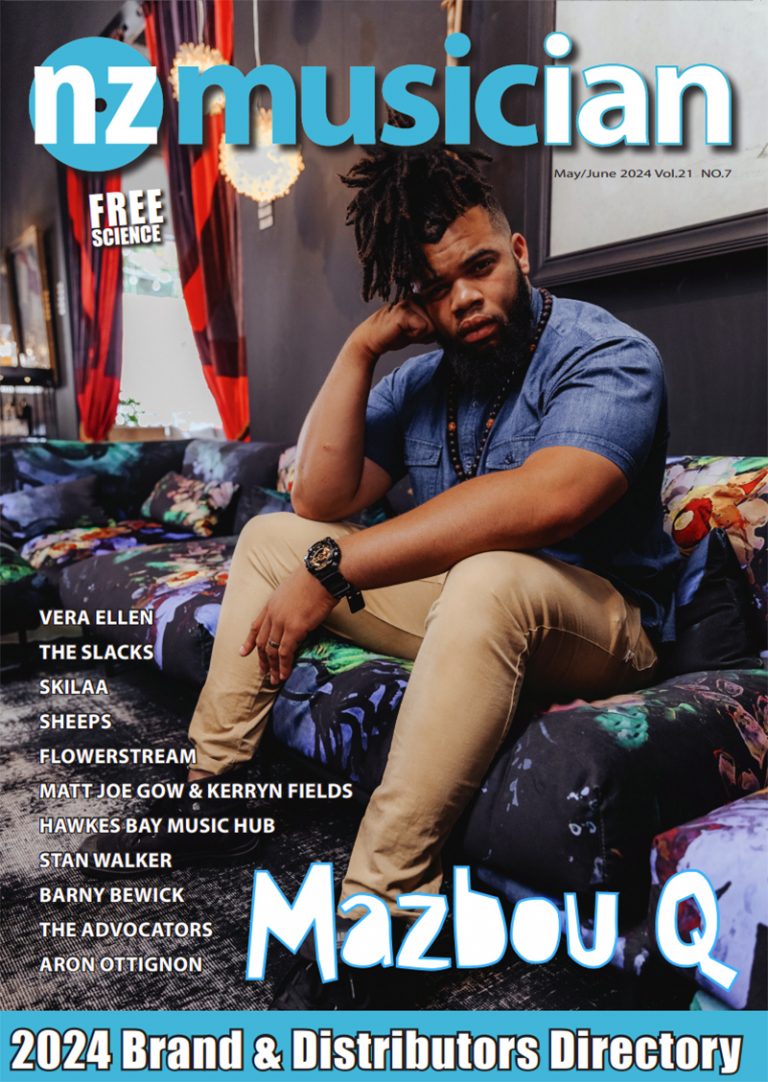Woodcut Music: Modelled For Success
Woodcut Music: Modelled For Success
The 20th anniversary of any business active in the NZ music industry is a milestone well worth recognition and celebration, but it seems that Auckland’s Woodcut Music isn’t a business that likes to draw attention to itself. With two record labels and a combined roster that includes Smashproof, Swizl Jager, Tazman Jack and Cody Wave, there’s plenty of artist action; but there are more facets to the Woodcut model, as NZM’s Richard Thorne learns from co-founder Aaron Christie.
Promotions in May / June around free online music producer training that Woodcut Music is providing for six lucky participants may well have been the first time some applying had even heard of the Auckland business. Which is odd given that Woodcut has been around for over 20 years, and can legitimately lay claim to producing one of this country’s most successful ever hip hop singles.
 Co-owner Aaron Christie doesn’t seem at all fazed that Woodcut Music’s 20th anniversary passed without fanfare. If he were then it’d be more than offset by the pride he expresses in the resilience of the business model that he and Justin Ferguson (aka Juse) built, literally from the ground up, over the 25 years they’ve known one another.
Co-owner Aaron Christie doesn’t seem at all fazed that Woodcut Music’s 20th anniversary passed without fanfare. If he were then it’d be more than offset by the pride he expresses in the resilience of the business model that he and Justin Ferguson (aka Juse) built, literally from the ground up, over the 25 years they’ve known one another.
“We are a music production and publishing company, with three main aspects of our business,” Christie explains of Woodcut in 2022. “One is the artist music that we produce and publish, and that’s done through our two record labels, which are Move The Crowd and Empire Records.
“The second main part of our business is compositions, the commissioned creative work where we are called on by corporate advertising, film and TV production companies, to create music or audio specific to a production.
“The third part is our production music publishing business. We have NZ’s only APRA AMCOS production music business, and we provide production music – essentially a different type of music product – again to the broadcast film and TV industries, and radio as well, for quick turnaround or budget-driven production needs.
“Sometimes those areas do cross over, but that’s how we divide them up as the three main aspects of our business. We think of ourselves more as a music company rather than as a record label.”
Estimating the ratio of turnover as almost equal thirds he notes that’s not at all consistent, with some artist projects proving less successful and the commercial business aspects fluctuating too.
“And that’s something I reiterate to artists; that it’s really important in this business to have different revenue streams. Covid has been a classic example. If live music is your whole income and suddenly you’re not performing then you need to find other ways to make some money. Having some music released, producing other artists’ music, having some production music earning a few bucks here and there, it’s really important to tap into those alternative revenue streams, and I think that one of the reasons we’re still here is that we’ve explored those different parts of the business.”
The business was formalised in 1999, but according to Christie the idea of developing a music company probably arrived three years prior. Then in his mid-20s, Christie had not long returned from his OE and was working in marketing of design and print industry as a production manager. The pair were introduced by a mutual friend who knew of his passion for music and that Ferguson, just a few years younger, was a talented music producer.
“He had evolved from DJing to production and was into sampling and making beats, so had skills I was blown away by. I’d arrived in Auckland with a background in advertising and interest in music for ads and things like that, and I was really taken with his talents.
“He is the son of Tommy Ferguson, who was a well-known old-school soul singer back in the day – called the ‘Joe Cocker of NZ’ by some people! Justin always used to say he grew up in nightclubs, and he was of a new era in producers and DJs, part of this very exciting Token Village scene which included artists like Che Fu, King Kapisi, Ned Ngatae, Mark Williams, Chip Matthews… a thriving community of Auckland artists making music with samples and drum machines and sequencers. Justin was the DJ in Token Village, as well as for Dam Native and others.”
The pair started by talking about how they could work together and for a few years would meet up after work, finding small projects for their joint venture to get involved with. Christie eventually went on contract with his corporate job and worked at Woodcut part-time, until they decided to commit to the business full-time.
“There were two main aims when we started. One was to make great music for film and television (there was no internet in those days), and the other thing was to nurture and develop NZ artistic talent. And they still stand today.
“We felt strongly that there was not enough money in the NZ music industry, so we were looking for different ways we could get involved and make a living out of it. There were people making music for film and TV, and people working with artists, but probably not a lot of people doing both. So we were rather novel in that we were trying to cross both areas.”
Given the choice of ‘flourished’ or ‘graft’ to describe Woodcut’s 22 years in business, Christie opts for a bob each way.
“Flourished in terms of creativity – but definitely grafted in terms of finances,” he smiles with rueful honesty. “We’ve had some amazing successes creatively and as a business over the years, but it has never been easy, even when we’ve had what from the outside would have looked to have been significant successes.
“One of the reasons we are still here today is that we’ve never really drawn a lot of money out of the business, never paid ourselves a lot of money, but have been able to steadily grow our turnover to allow for us to develop more. What we have done is built a sustainable business, which in this industry is fairly rare. We’ve managed to stick around through graft.”

Housed since 2008 in a tiring early 1900s villa, just off New North Rd in Auckland’s Uptown area, the employment structure of Woodcut has changed little over two decades, although Ferguson is these days a stay-at-home dad and no longer involved day-to-day.
“There’s three of us operating on a full-time basis. Hayden Gyde is our sound engineer and also an extremely good administrator, so is my right-hand man and wears a lot of hats. He helps out with label operational matters and management of the production music catalogue.
“Tom Lee is our resident producer – we generally have a producer to run the studio for us and handle all the work that comes through that. Haden assists him with mixing and mastering work as well.
“My role is like a production manager. When we get a project in I manage that and ensure the work gets done by the right people, and we all get paid. I’m not a producer myself, that music side of the business was always Justin’s role and I was the administrator. I’ve never been good enough to get involved with production, when I started working with good artists and producers I sort of stepped away from that side of the business!”
The “first real artist” they worked with was Te Reotakiwa Dunn, a soul singer (and also taonga pūoru artist) from Hokianga who Ferguson knew of from family connections. The golden Tui trophy on a shelf behind him when we talk was for Dunn’s self-titled album winning Best Maori Album at the NZ Music Awards in 2006, Christie describing it as a massive achievement for Woodcut in realising that they could “compete with the big guys” and have that sort of impact. For him it rates as one of Woodcut’s key events/achievements over their two decades in business.
“Brother by Smashproof is absolutely another one. The success of Brother was absolutely mind-blowing. I still think of it as a bit of a blur, the whirlwind of success that it had and being a part of that was incredible. Seeing how one song can impact people so much is definitely a big part of our history, and something to treasure.
“That was just an amazing combination of great beats, a great hook written by Ty [Tyree Tautogia], powerful verses written by the guys, having Gin Wigmore involved, having Chris Graham create the video… and 15 years after that you really realise how hard it is to achieve those kind of heights! It’s a whole combination of factors that lead to that success and it’s fun to be a part of.
“Hooking up with Kirk Harding and creating Move The Crowd Records was definitely one of the major impacts on our business. Pari Rikihana used to work with us on the record label side and we knew about Tyree (who started Smashproof) from seeing him win a prize with a song called Friday Night, and we thought he was awesome as a hip hop and RnB singer.
“This was early-mid 2000s. We got Ty in and he recorded heaps of demos. Then we decided to send Juse on a creative trip to help him produce his own album. ‘Stinky Jim’ Pinckney suggested he should catch up with this guy Kirk Harding who was doing well in New York hip hop. Juse did this three-month OE and saw Zane Lowe in the UK and Kirk in the States, and recorded with lots of people (including Plan B). Juse played Kirk some of Tyree’s recordings and he thought they were awesome and wanted to be involved, to do a label with us.
“It snowballed from there. Ty mentioned he had a couple of mates from school who had also been making music with him, and introduced us to Young Sid [Sid Diamond] and Deach [Fa’afou], who really complemented the both of them, so suddenly we had Ty and Smashproof, and the idea of Move The Crowd as a label began there.
“Kirk came over then went to over talk with Universal Music in Australia, and that was at a time when Australia’s urban music scene wasn’t very strong at all. So they were keen to link with us and signed up a three-year deal, with Kirk handling all the A&R and Woodcut managing all the production. We had some exciting years there, making some great music and had some amazing experiences over in Australia – and getting paid to make records!”
Illustrating the diversity of delivery platforms that lie at the root of Woodcut’s longevity, another major success story for the business came when C4 Music Television was developed alongside the then Canadian-owned TV3, with NZ On Air funding.
“So MediaWorks created C4 and we pitched and got the job to create the music floors for each of the 15 different format shows, plus the branding for C4. So we were a big part of that development of our own dedicated NZ music channel, and were very proud of that. It was months of work, and we outsourced quite a lot of it, but I think that showed we had the capabilities to produce all kinds of music and administrate the processes.”
Production music is the less familiar third of their business, a point of difference and interestingly a focus for the free producer training scheme that Woodcut is presenting over three winter months in 2022.
“About four years ago now we upgraded the website to include our production music business and that was a big step for us. Initially, when we developed the production music business we were burning CDs and printing out covers then taking them around broadcasting houses saying, ‘Here’s some NZ production music you can use if you like.’
“I’d still call that a fledgling business for us, even though we’ve been doing it for 15 years, but it was very hard to compete with the international publishers who could literally just give local production companies these expensive hard drives with thousands of tunes on them. But the web technology has allowed us to compete with them now, and everyone can access our music online. We struggled for a few years to develop that technology and compete better for some market share of that business. We’re looking now to market more to production music clients in Australia.”
Backtracking a bit, Christie says he’d have to include having the now internationally-known producer Josh Fountain working with Woodcut for eight years as another Woodcut highlight.
“We’ve always had a resident producer and Josh was the third kind-of-trainee that we’ve had come in. He came out of the MAINZ engineering course, with the recommendation of Angus McNaughton. To see him grow and develop as a producer was awesome, and then of course seeing what he has gone on to achieve since then. [Benee, Leisure.]
“The success and achievements of Josh is something we’re proud to be a part of. He made a lot of our catalogue and recorded the two Kidz In Space albums while he was here. I think it was from that success that people came to notice Josh, and eventually, a guy named Joel Little came along and offered him a job – which was pretty hard for us to compete with!
“He left us probably five years ago and was replaced by Tom Lee who has grown to become another outstanding producer, and artist as part of dance act Lee Mvtthews who are now starting to make headway internationally. He’s produced a lot of great music for us and our artists. Matt Scott is another successful graduate of ours. He engineered Te Reotakiwa Dunn’s album. Producer Willy Henderson was also an alumni. So they have been big parts of what we’ve done.”
While Smashproof’s 2009 smash hit Brother (platinum sales and 11 weeks at #1 of the NZ Top 40 Singles chart) obviously rates as a highlight, it also features in the disappointment column, and could be said to have shaped Woodcut’s outline since. Being a minnow in the major label pond is notoriously a recipe for predation.
“At that time we had the record deal with Universal Music Australia… and we haven’t really seen any money from that song’s fantastic success. They gave us good advances to make albums – we got $35,000 to make an album, which was huge amount for us back in those days – but the way those licensing deals were structured, even with a huge success you don’t necessarily earn any money from that. So we’ve learned lessons along the way, but I think that for the most part, people in the local music industry do okay, and that’s the nature of the NZ market size.
“By the end of that three-year deal, we had realised that we couldn’t really hope to make much money with that model and it was very much a mutual decision to stop at that point. We knew Phil Howling at Warner NZ and talked with him about a P&D deal, and so we had distribution and promotion support through Warners for years after that deal with Universal. Of course, we had to finance everything ourselves, but it was a good deal for us and the financial returns were probably better, in the sense of earning money after the releases, rather than before them.
 “We got very caught up with Move The Crowd and it became all-consuming, but after a while, we wanted to work with other artists who weren’t necessarily urban artists. So we created Empire Records so we could do pop and RnB, and other music, without diminishing the Move The Crowd brand as an urban label from NZ.”
“We got very caught up with Move The Crowd and it became all-consuming, but after a while, we wanted to work with other artists who weren’t necessarily urban artists. So we created Empire Records so we could do pop and RnB, and other music, without diminishing the Move The Crowd brand as an urban label from NZ.”
The digital flexibility of the music business has evolved to such a degree since that five or six years ago both labels could become fully independent.
“Sid’s a shareholder in Move The Crowd, and Ty and Deach are shareholders in Empire Records, so we’ve tried to give the Smashproof guys some ownership and the chance of more successes. Empire has been more financially successful than MTC. We’ve had fun with Move The Crowd!
“Deach and Ty have both had great successes as artists in the streaming era. Deach’s song Be With You has been around for 10 years and is still our best performing streamed track – it’s around 6 million on Spotify and gets about 40,000 streams a week! He’s got four other tracks with over a million plays as well. So Empire has been good for us and we have some exciting younger artists on the label now.”
Which brings us neatly back to Woodcut’s 20+ years in business and how they marked that significant milestone.
“We did celebrate internally,” Christie smiles, “but for us we still have a sense that we are finding our way… It’s funny to say, but we’ve gone through so many stages and there is still work to be done. The fact that we’re still here after 20 years, and still like what we are doing, is something we’re definitely proud of.”
- aaron christie
- angus mcnaughton
- apra amcos
- auckland
- c4
- che fu
- chip matthews
- chris graham
- cody wave
- dam native
- deach
- deach fa'afou
- empire records
- gin wigmore
- hayden gyde
- jim pinckney
- josh fountain
- juse
- justin ferguson
- kidz in space
- king kapisi
- kirk harding
- lee mvtthews
- leisure
- mainz
- mark williams
- matt scott
- mediaworks
- move the crowd
- ned ngatae
- nz on air
- pari rikihana
- phil howling
- richard thorne
- sid diamond
- smashproof
- stinky jim
- swizl jager
- tāmaki makaurau
- tazman jack
- te reotakiwa dunn
- token village
- tom lee
- tommy ferguson
- ty
- tyree
- tyree tautogia
- will henderson
- willy henderson
- woodcut music
- young sid
- zane lowe
